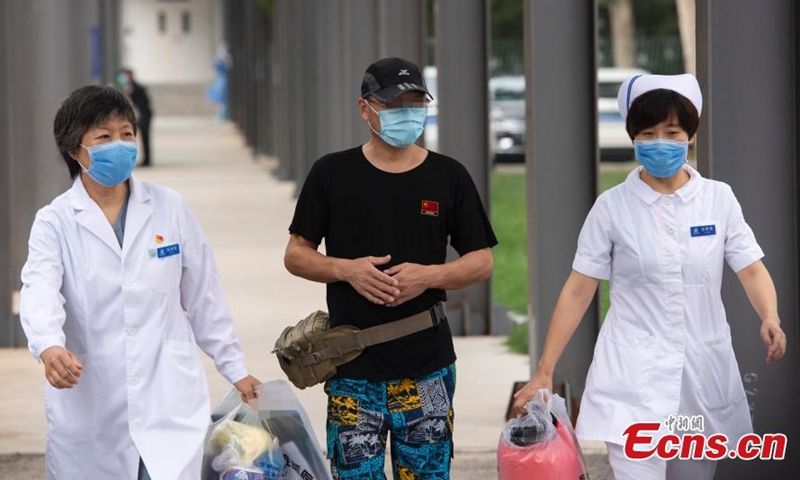Beijing doubles quarantine period to 28 days as scientists fear virus may be more contagious than the one in Wuhan
By Zhao Yusha Source:Global Times Published: 2020/6/29 22:18:40

Photo shows cured patient He, the first COVID-19 patient to recover from the latest outbreak in Xinfadi wholesale market was discharged from Beijing Ditan Hospital, after testing negative for coronavirus two times, June 29, 2020. The 56-year-old man, surnamed He, is an airport shuttle bus driver, and was diagnosed as a coronavirus patient on June 13, two days after the resurgence in Xinfadi wholesale market. (Photo/China News Service)
Beijing has doubled the COVID-19 quarantine period from 14 days to 28 as scientists fear that the type of coronavirus that set off Beijing's recent outbreak in the Xinfadi market may be more contagious than the one in Wuhan.
Most people under quarantine in Beijing are workers from the beef and lamb section of the Xinfadi market, which makes them a high-risk group for COVID-19 infection, said Shi Guoqing, an expert from China's National Health Commission (NHC), at a Monday conference.
Shi said some of those who were infected had either shown no symptoms at all or demonstrated atypical symptoms, so it's hard to judge if they had contracted the virus simply by observing their symptoms.
Moreover, because some infected had an initial negative test result, solely relying on a negative nucleic acid test, and no abnormality being found within 14 days, is not sufficient to confirm if they were infected, said Shi, noting it is possible they would spread the virus to others once allowed to move freely.
Chu Junwei, deputy head of Beijing's Fengtai district, said on Sunday that the lockdown period for quarantined persons who were connected with the beef and lamb market section has risen to 28 days.
Shi noted on Monday that this group of people will receive a nucleic acid test after being quarantined for 14 days, and another test after the 28-day quarantine, just in case.
Shi said that 33.8 percent of the confirmed cases in Beijing were workers from the beef and lamb section of the Xinfadi market, while 20.5 percent were visitors to this area.
Beijing's municipal health commission published an article on Monday, saying that this strain of coronavirus, which is believed to have been imported to China, may have come from Europe as early as March, then travelled to South America, and was finally imported to China by human carriers or imported meat, which set off Beijing's outbreak.
Yang Zhanqiu, deputy director of the pathogen biology department at Wuhan University, told the Global Times on Monday that many people were infected in Beijing within a short period, and all were related to Xinfadi. This means that this strain is more contagious than the one found in Wuhan, and it is possible a "super spreader may exist in the Xinfadi market."
It is safer to impose stricter measures on high-risk groups, Yang noted.
Currently, if someone tests negative for nucleic acid, it means that they're safe, Wu Zunyou, chief epidemiologist at the Chinese Center for Disease Control and Prevention, told the Global Times. To address public concerns over someone who tested negative but was later confirmed to have contracted the virus, Wu dismissed the possibility of such people being contagious.
"Even if someone was infected but could not be tested via throat swab, the possibility of passing the virus to others through breathing is very slim," said Wu, admitting that more testing methods are necessary for key groups.
RELATED ARTICLES:
Posted in: SOCIETY,FOCUS